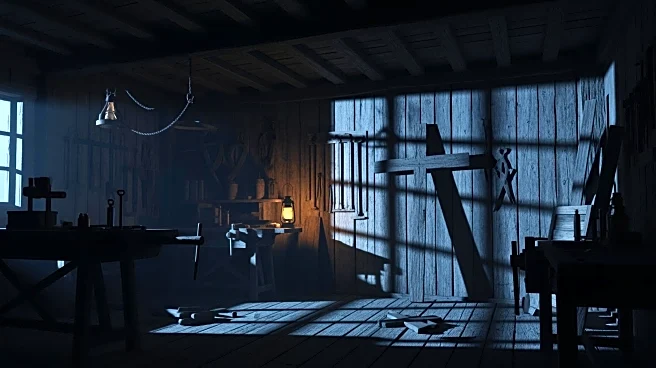What's Happening?
Nicolas Cage stars in 'The Carpenter's Son,' a supernatural thriller that reimagines the Infancy Gospel of Thomas, an apocryphal text about Jesus' childhood. Directed by Lotfy Nathan, the film portrays
Jesus as a young boy tempted by Satan to rebel against his father, Joseph, played by Cage. The narrative is based on the Infancy Gospel of Thomas, which was popular among early Christians but did not make it into the New Testament. The film aims to explore the untold origin story of Jesus, filling in narrative gaps with creative storytelling. The movie also features FKA twigs and Noah Jupe, and is set to open in theaters soon.
Why It's Important?
The film 'The Carpenter's Son' offers a unique perspective on the life of Jesus, diverging from traditional biblical narratives. By exploring themes of temptation and rebellion, the movie challenges conventional depictions of Jesus, potentially sparking discussions on religious interpretations and cinematic portrayals of sacred figures. The film's approach may attract audiences interested in historical and religious narratives, while also appealing to fans of supernatural thrillers. Nicolas Cage's involvement adds star power, potentially increasing the film's visibility and impact on both religious and secular audiences.
What's Next?
As 'The Carpenter's Son' prepares for its theatrical release, it may face scrutiny from religious groups and critics who question its portrayal of Jesus. The film's reception could influence future projects that explore religious themes, encouraging filmmakers to delve into lesser-known texts and narratives. Depending on audience reactions, the movie might inspire further adaptations of apocryphal gospels, contributing to a broader understanding of early Christian literature. The film's success could also impact Nicolas Cage's career, reinforcing his versatility in tackling diverse roles.
Beyond the Headlines
The adaptation of the Infancy Gospel of Thomas into a horror film raises questions about the ethical implications of reimagining religious texts. It challenges viewers to consider the boundaries of artistic expression when dealing with sacred subjects. The film's narrative choices, such as omitting certain controversial elements, reflect a careful balance between creative freedom and respect for religious sentiments. This approach may influence future filmmakers in their handling of religious material, encouraging thoughtful engagement with historical texts.










